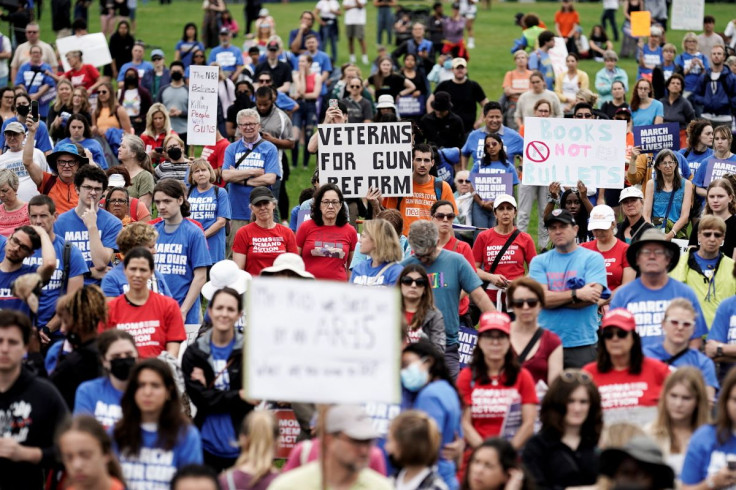Gun-safety Bill Heads Toward Final Passage In U.S. House

Gun control legislation advanced in the U.S. House of Representatives on Friday as lawmakers moved toward final passage of a package of modest steps, one day after a Supreme Court ruling that broadly expanded gun rights.
The deeply divided House voted 217-203 - with no Republicans in support - to advance the bill toward passage, after the Senate passed the legislation late on Thursday.
The House is expected to finish work on the bill later on Friday and send it to Democratic President Joe Biden for signing into law.
The bill would be the first significant gun control legislation to pass Congress in three decades.
"The legislation...includes several strong steps to save lives, not only from horrific mass shootings but also from the daily massacre of gun crime, suicide and tragic accidents," House Speaker Nancy Pelosi said during debate on the bill.
Noting that guns have become the leading "killer of children in America," Pelosi said Congress must go beyond this bill and legislate more improvements to gun-sale background checks and "high-capacity armament."
The bill does take some steps on background checks by allowing access, for the first time, to information on significant crimes committed by juveniles. It also cracks down on gun sales to purchasers convicted of domestic violence. And it provides new federal funding to states that administer "red flag" laws intended to remove guns from people deemed dangerous to themselves and others.
"Today they (Democrats) are coming after law-abiding American citizens' Second Amendment liberties," said Representative Jim Jordan, the senior Republican on the House Judiciary Committee. He was referring to the constitutional right to "keep and bear arms" that conservatives argue should be broadly protected.
While House Republicans, at least so far, were in lock step opposition to the bill, it got bipartisan support in the Senate, which passed it on a 65-33 vote with 15 Republicans, including Senate minority leader Mitch McConnell in favor.
The gun-safety legislation and the gun rights-expanding Supreme Court ruling illustrate a deep divide over firearms in the United States, weeks after mass shootings in Uvalde, Texas, and Buffalo, New York, killed more than 30 people, including 19 young children at an elementary school.
The Supreme Court, with its 6-3 conservative majority, struck down New York state's limits on carrying concealed handguns outside the home. The court found that the law, enacted in 1913, violated a person's right to "keep and bear arms" under the U.S. Constitution's Second Amendment.
The National Rifle Association, the nation's most powerful gun lobby, declared the ruling "a monumental win" for American gun owners.
By contrast, the legislation in Congress is modest in scope for a country with the highest gun ownership per capita in the world and the highest number of mass shootings annually among wealthy nations.
In 2020, the rate of gun deaths in the United States surged 35% to the highest point since 1994, with especially deadly levels for young Black men, the U.S. Centers for Disease Control and Prevention said in a report published May 10.
© Copyright Thomson Reuters {{Year}}. All rights reserved.





















